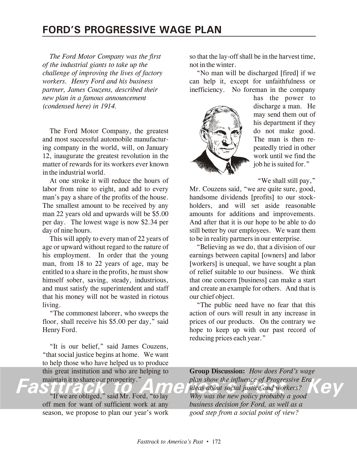| Fasttrack
to America's Past Teacher Key |
|
| Fasttrack
to America's Past Teacher Key |
|
 Page 172 |
Page 172 -
Ford's Progressive Wage Plan The reading selection This announcement by the Ford Motor Company in 1914 represents an important shift in labor history in the U.S. In it, the hugely successful auto maker declared itself committed to such Progressive movement ideas as "social justice" for workers, and said it hoped to "create an example" for other companies to follow. James Couzens, Henry Ford's business partner, was the main force behind the new policy. But Ford accepted his arguments that higher wages would be good for the company and its workers. Ford was denounced by many other wealthy business owners as "a traitor to his class" after the announcement. But over time, the good sense of the new wage policy became apparent. Notice that the Ford company, like others at that time, felt perfectly justified in setting policies that today would never be allowed. For example, young men had to prove they were "sober, saving, steady, and industrious," and would not waste the extra pay in "riotous living." The picture Henry Ford, the mechanic who became a business leader and developed the first successful mass produced automobile. By the mid-1920s the average American family had a car. More often than not, it was a Ford Model T. Group discussion questions For example, in the announcement James Couzens uses the phrase "social justice" and declares that workers should "share our prosperity." Henry Ford announces not only the higher pay, but details a plan to avoid unnecessary firings of workers. Better pay and better conditions for workers, of course, were key goals of Progressives. Couzens says the new plan will not raise prices or harm the company's profits. Progressives had long argued that better treatment of workers would create a stronger business climate. Couzens speaks of achieving a more equal division of earnings between "capital and labor" - this, again, was a goal of the Progressives. The new policy was not just a humanitarian gesture or and act of charity. The Ford assembly lines were plagued by high turnover. The work was fast paced and tedious. It was difficult to keep production high if workers were absent, late, under nourished, or distracted by problems at home caused by poverty. Higher pay raised the incentive for workers to perform well, and helped them build a stable home life. It also allowed them to afford to buy Ford automobiles. In short, Henry Ford and has partner James Couzens realized early on that treating employees well and fairly is good business.
|
|
Copyright Notice
Copyright 2018 by David Burns. All rights reserved. Illustrations and reading selections appearing in this work are taken from sources in the public domain and from private collections used by permission. Sources include: the Dover Pictorial Archive, the Library of Congress, The National Archives, The Hart Publishing Co., Corel Corporation and its licensors, Nova Development Corporation and its licensors, and others. Maps were created or adapted by the author using reference maps from the United States Geological Survey and Cartesia Software. Please see the home page for this title for more information. |